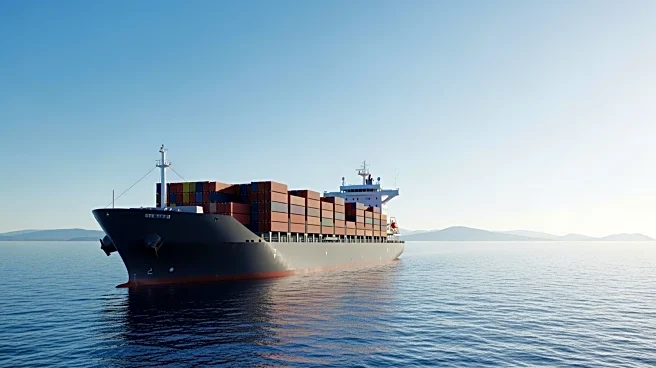What's Happening?
Matson, a leading U.S. ocean container carrier, is set to save up to $80 million annually following the postponement of reciprocal port fee programs between the U.S. and China. The company had anticipated
significant costs due to these fees, which were part of a broader tariff and trade policy environment. Despite the postponement, Matson reported a decline in ocean revenues and income, attributing this to cautious customer behavior and a muted peak season in its transpacific trade lane. The company experienced a 12.8% drop in container volume for its China service in the third quarter and expects a 30% year-over-year decline in operating income for the fourth quarter. Matson is awaiting further instructions from the U.S. and China regarding potential rebates on fees already paid.
Why It's Important?
The postponement of port fees is a significant relief for Matson and other shipping companies facing financial strain due to global trade uncertainties and tariffs. This development may stabilize trading conditions, encouraging cautious customers to adjust inventory levels and potentially increase shipping volumes. The agreement between the U.S. and China could signal a move towards more stable trade relations, impacting global shipping and trade dynamics positively. However, Matson's financial outlook remains cautious, reflecting broader industry challenges in adapting to fluctuating trade policies and economic conditions.
What's Next?
Matson is closely monitoring the situation for further instructions on port fee rebates, which could alleviate some financial burdens. The company is also preparing for potential changes in customer behavior as trade conditions stabilize. Industry stakeholders, including other shipping companies and trade partners, will likely react to these developments, potentially influencing future trade agreements and shipping practices. The broader impact on global trade relations and economic policies will be watched closely by industry analysts and policymakers.
Beyond the Headlines
The postponement of port fees highlights the complex interplay between international trade policies and corporate financial strategies. It underscores the importance of diplomatic negotiations in resolving trade disputes and their direct impact on business operations. The situation also raises questions about the long-term sustainability of tariff-based trade policies and their effects on global economic stability.










